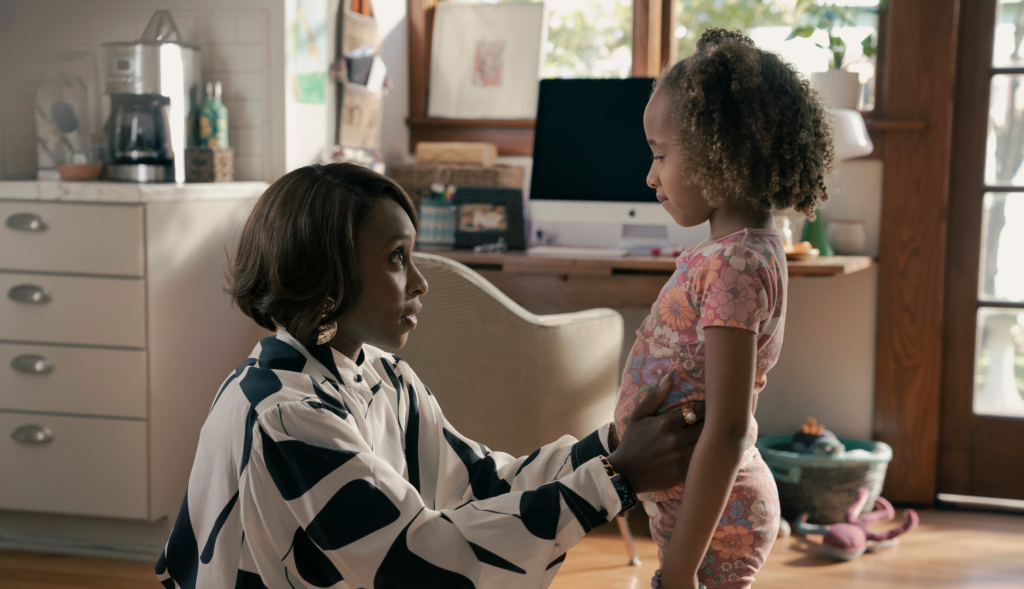In the new show from “GLOW” creators Liz Flahive and Carly Mensch, a tall, statuesque blonde model becomes an actual trophy wife. A Black author realizes no one can see or hear her. A middle-aged hairdresser begins eating pictures in order to hold on to a phase of life that’s coming to an end. An executive notices mysterious scars and lacerations on her body after she returns from maternity leave.
Featuring a star-studded cast and an all-female roster of writers and directors, “Roar” is a collection of half-hour fables heightening, satirizing, and deconstructing the plight(s) of life as a woman. Each of the eight episodes (I’ve seen four) centers on a woman experiencing an allegorical, yet very recognizable, conflict. At the same time, this anthology project — based on Cecelia Ahern’s book of short stories — is smart enough to recognize that there is no one narrative that can encapsulate every woman’s journey. Yes, there are generalities and common occurrences, but factors such as race, culture, class, sexual orientation, age, and ability ensure that there are as many types of women’s experiences as there are women themselves.
“The Woman Who Disappeared,” for example, investigates how contemporary U.S. society treats the Black community, Black women in particular, as if they are invisible. Issa Rae’s titular character is a writer mulling a possible screen adaptation of her bestselling memoir, which recounts a traumatic interaction with the police. When she arrives at the film studio’s offices, the camera that’s supposed to take her picture for a temporary I.D. can’t capture her likeness — an example of the real-life phenomenon of A.I. being racially biased. Next, she realizes that the entirely-white team of execs want to hijack her story for an appallingly tone-deaf attempt at anti-racism. Finally, as she tries to explain her concerns about their plan, it’s becomes clear that not only will the studio not listen to or empathize with her, they literally can’t see or hear her. It’s a magical realist device that really hits home white people’s maddening tendency to center themselves in every situation, even when they believe they’re being allies.
“Roar’s” other episodes use similarly fantastical-yet-disturbing stakes to unpack a particular facet of that huge umbrella concept known as womanhood. The Woman Who Ate Photographs (Nicole Kidman) is dealing with aging: her mother (Judy Davis) has been diagnosed with dementia and is moving in, while her teenage son is college-bound. The future is uncertain and everyone is getting older, not least of all herself; she wants to go back to happier, simpler times, and consumes pictures to do so.
The Woman Who Was Kept on a Shelf (Betty Gilpin) has only ever been valued for her looks. When her new boyfriend (Daniel Dae Kim) proposes she quit work so he can take care of her — which, yes, includes sitting and looking pretty on a custom-made shelf — she reluctantly agrees. It’s unorthodox, sure, but it’s not like she can contribute anything else to the world, right?
As for The Woman Who Found Bite Marks on Her Skin (Cynthia Erivo), the pressures of being both a successful businesswoman and a present, nurturing mother to two young children are too much to handle. Feeling like she’s falling behind at work and dealing with the demands of her husband and kids, her inner turmoil manifests itself as external indentations, boils, and cuts. Her health concerns are further complicated by her overall wariness of the medical establishment: when she gave birth to her second child, she knew something was wrong but the doctors didn’t believe her. She ended up hemorrhaging and nearly dying.
As you’ve probably guessed, “Roar” manages to pack a lot into each 30-minute story. Threads about mother-daughter relationships, gender roles, imposter syndrome, and the healing power of sisterhood are woven into the episodes’ central themes. We don’t get too much time with the characters or their worlds, yet both are expertly brought to life by the cast and creatives. (Alison Brie, Merritt Wever, Meera Syal, Fivel Stewart, and Kara Hayward are also among the stars, while Kidman, Ahern, and Bruna Papandrea executive produce alongside Flahive and Mensch.) Even though each of these stories has a message to impart, The Women of “Roar” are never reduced to one-dimensional symbols. They are the heroines of their own macabre fairy tales, and, at the same time, incredibly real.
“Roar” is now available on Apple TV+.







